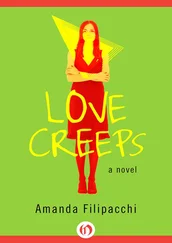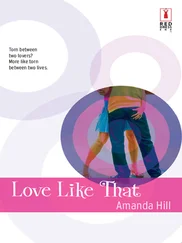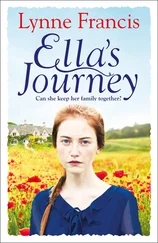“Should I be scared?” he asked.
· · ·
The nurse called later that afternoon and explained in no uncertain terms that the doctor would not give me the drugs I had requested. She added that it was against every tenet of the medical establishment to prescribe drugs when a patient was not ill. I hung up the phone, instead of saying, “You self-important bitch.” At home that evening, I cried again.
My husband watched me skeptically. We were eating Freebird burritos, sitting on our front porch and peeling off aluminum foil in small, metal circles. “We’re not going to get anthrax,” said my husband. He made a sound that I would classify as an incredulous snort.
“I know!” I said. I bit into my burrito, which I had ordered with extra guacamole. Extras were a dollar, and usually I refrained, but I had the feeling that I should live life to the fullest, and make a celebration of every day.
“And I want you to stop watching so much television,” said my husband. He had been talking, it seemed, for some time. I nodded, and he turned his head toward me, squinting as if I were a scientific mystery. “Oh, honey,” he said.
Nonetheless, I did watch television that night after my husband had fallen asleep. I sat in the front room in my pajamas, watching bombs and food rations fall. I drank a warm glass of milk and watched dirty children rip open bags of Pop-Tarts and jam them into their mouths.
The next day, I discovered an advertisement for Cipro on the back page of the Austin Chronicle . There it was, sandwiched between a massage therapist and a Spanish tutor: CIPRO AVAILABLE 1-800-CIPRONOW. (The last “W,” it seemed, was for effect.) Ceramic City was empty again, and I picked up the phone.
When I got home that evening, my husband was making linguine with clams. There was an open bottle of wine on the table, and two wineglasses. My husband had gone to some trouble: cloth napkins, the whole nine yards. In the kitchen, he was stirring dinner and leafing through a fishing catalog. I came into the kitchen and put my arms around him. “I’m your apron,” I said.
“Look at this,” said my husband, pointing to the catalog. “A baby-size fishing rod. I can take our little boy out in the canoe.”
“Or our little girl,” I said.
“Whatever,” said my husband. “Either way, the change jar is now officially for the baby. For a little fishing rod, or maybe a little life vest.”
As we ate the linguine, which was delicious, I brought up the Cipro. I explained that the pills we needed to stay alive for ten days would cost three hundred dollars. My husband put down his napkin, and looked at the table. He unclenched his fists and placed each hand carefully on either side of his plate. Finally, he lifted his head. He took a breath, and I saw him make the decision to act rationally. “We don’t have any money,” he said.
“Well,” I said, “we do have the change jar.” My husband nodded, his eyes closed. “If we die of anthrax,” I said, “what will a fishing vest be good for?” Even I could tell I sounded hysterical. We sat in silence and finished the bottle of wine. My husband then stood up and left the room. He came back with the jar, which he overturned. Years of change spilled over the floor.
“It happened without them knowing,” I said. “I want to be ready.”
My husband did not look at me. He sat cross-legged on the floor and began counting. The change jar added up to one hundred seventy-two dollars and sixteen cents.
“What are we going to do?” I said.
“Just get half,” said my husband. “Save yourself,” he said. And then he went and took the sleeping bag from the closet, and he placed it on the couch.
“I’ll get enough for both of us, for five days,” I said. “Five days will be enough to figure something out.” I stood next to the couch, where my husband was feigning sleep. “I’m just asking for five days,” I said. “I don’t think that’s unreasonable.”
The man at 1-800-CIPRONOW had told me to meet him in the alley between San Antonio and Sixth. I drove there the next morning, a plastic bag of change in the passenger seat. “You’ll be glad,” I told my husband. “You’ll thank me later.”
The CIPRONOW man was Hispanic. He wore tight Wrangler jeans and a T-shirt with an American flag. Over the phone, he had explained that the Cipro was his mother’s prescription; she needed money more than the drugs.
The man, whose flag shirt, upon closer inspection, was not very clean, was unhappy about splitting up the prescription. “What you need,” he said, “is the full thirty pills. Three times a day for ten days. That’s what you need.”
“I’m sorry,” I said, gesturing to the bag. “This is all I have.”
“All you have,” said the man, and he laughed. I blinked. “No deal,” said the man, shaking his head.
“Well, fuck,” I said. The change bag and I drove away.
That evening, as my husband grilled hamburgers in the backyard, I thought about how to get another hundred dollars and change. With our student loans, there just wasn’t a dime to spare. “I already gave you all my money,” my husband said, dramatically. “You can’t live your life this way,” he said, among other comments that amounted to same. “I can sell something,” I said.
“Oh really?” said my husband. He put his hands on his hips, and the spatula stuck out awkwardly. “Really?” he said. “What do you have to sell?”
I did not answer. The damn fact was that I had nothing to sell. My books, maybe, or my bod. Unhappily, neither would likely bring a hundred dollars. I did not sleep that night. I lay awake, and dreamed about dying horribly, with lots of gasping. Worse, I dreamed of life without my husband, our house, our canoe. I dreamed of living in a cave, with no access to the sunlight, and no food.
The next day, anthrax was found in a letter mailed to NBC News. “Now tell me I’m crazy,” I said to my husband, who had brought me a tuna sandwich at Ceramic City.
“I never said you were crazy,” he said, wiping his lips with a napkin. “I’m just trying to say that if we’re going to die, well…” He lifted his hands up, a gesture of acceptance.
“I can’t,” I said. “I can’t just wait. Can you understand?”
My husband shook his head, his eyes full of sadness for me.
The CIPRONOW man said he would take a canoe and one hundred seventy-two dollars and sixteen cents. God knows why he wanted a canoe. Perhaps he had realized that the tide was turning: the government was in negotiations to buy a zillion tablets of discount Cipro, and the terrorists were hatching smallpox. The Cipro market was at peak performance.
Maybe he liked to fish, I don’t know.
I gave the CIPRONOW man our address. He arrived with a Ziploc bag full of pills and a trailer for the canoe. I invited him inside for a beer and he accepted. I gave him a Shiner Bock. “This is a beautiful home,” he said. He looked around, nodding. I saw it through his eyes: the books lined up in a row on the bookcase my husband had built for me, my copy of To Lake N’Gami and Back next to my husband’s Trout of the World . The cat—once my cat, but now ours —curled up in a circle on the floor. The large glass windows, which could shatter with little provocation. The CIPRONOW man sipped his beer, and then looked down at his American flag shirt.
I got things ready for my husband: I made a seafood stew with coconut milk and lemongrass. I put out two green bowls we had bought at a tag sale. Next to the salt and pepper shakers, which were shaped like Hawaiian dancers, I placed the bag of Cipro pills. They looked good, as if they belonged.
After some time, when my husband had not come home, I poured a glass of wine and called my mother. “I saw Lou Kensington at the Yacht Club Christmas party,” she confided. I could see my mother, leaning against the kitchen doorway in her New Canaan home. She twisted the phone cord around her finger, and although this habit had always seemed annoying, now it seemed precious, and I wished I had never moved away from her.
Читать дальше












